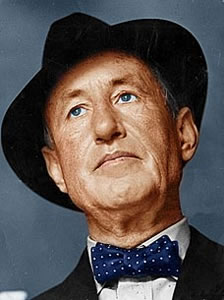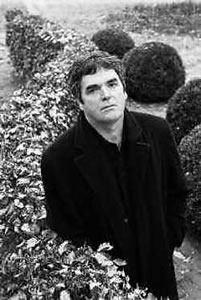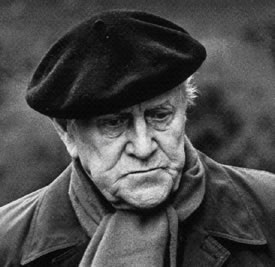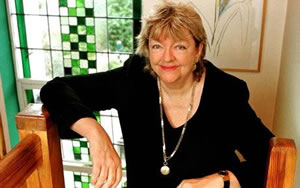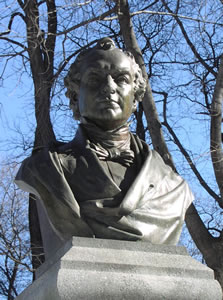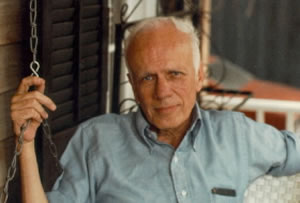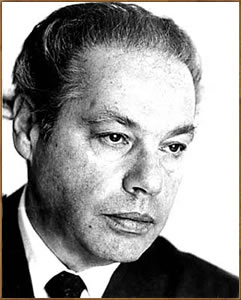De Belgische schrijver Leo Pleysier werd geboren in Rijkevorsel op 28 mei 1945. Zie ook mijn blog van 28 mei 2007 en ook mijn blog van 28 mei 2008.
Uit: Wit is altijd schoon
“En wie gaat er nu mijn doodsprentje schrijven? Zoudt gij dat niet doen?”
“Nee?”
“En waarom niet? Gij hebt toch altijd de pen nogal kunnen vasthouden, gij! Gij kunt dat dan toch best zou ik denken? Waarom zoudt gij dat dan niet doen? Ik zou liefst hebben dat gij dat doet. Voor uw eigen moeder kunt ge toch wel eens iets op papier zetten zeker? En daarbij: zo lang moet dat niet zijn. Een paar regels is genoeg.”
“Maar wat is ’t nu met u?”
“Aan wie moet ik het dan vragen? Is dat nu zoveel gevraagd om eens iets op papier te zetten voor mijn doodsprentje? Nu valt ge me maar tegen hoor! Amai!”
“Dat dat niet gaat, zegt ge. Waarom zou dat niet gaan? Gaat er dan zo eens op uw gemak bij zitten thuis aan tafel, dan zal dat toch wel gaan zeker! Zo moeilijk kan dat toch niet zijn! Een paar regels is genoeg.”
“Nu ja, we zullen dan wel zien. En ge hebt nog wel wat tijd om na te denken. En zoniet moet iemand anders het maar doen. Gaat gij nu ook maar naar huis onderhand. Ge zult ook wel moe zijn na zo’n dag. En morgen nog van alles te regelen. Ge zult de volgende dagen heel wat geloop hebben met mij. En doe het raam nu maar terug dicht zeker? En de lichten uit. En vergeet ook niet de voordeur op slot te doen. De sleutel neemt ge maar mee. En blijf morgenvroeg niet te lang weg.”
“Maar nee! Wat zou het! Wat zou ik daar nu ineens wel iets mee inzitten! Ik heb hier al zo dikwijls alleen gelegen in huis. Wat zou ik dat nu niet meer kunnen? Bang ben ik toch nooit geweest.”
“Gaat gij maar rap slapen nu. Ge zult uw rust vannacht wel kunnen gebruiken. Er zal nu toch niemand meer komen zeker? Anders waren ze al wel geweest, die van plan waren om vandaag nog te komen groeten. De rest zal dan morgen wel komen zeker? Of anders overmorgen? Nog tijd genoeg. Al maar goed ook dat ze niet allemaal tegelijk zijn gekomen. Want allemaal tegelijk, dat had hier toch niet binnen gekund vanavond. Zoveel volk ineens, zo’n drukte in huis, dat had niet gegaan. En het zal er nog niet op beteren de volgende dagen. Dat zal niet. Dat zal hier nog een hele begankenis worden. Ga maar slapen nu. Gij zult uw rust vannacht wel kunnen gebruiken.”
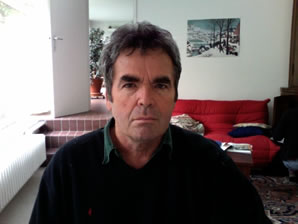
Leo Pleysier (Rijkevorsel, 28 mei 1945)
De Ierse schrijfster en columniste Maeve Binchy werd geboren op 28 mei 1940 in Dalkey. Zie ook mijn blog van 28 mei 2007 en ook mijn blog van 28 mei 2008.
Uit: Nights Of Rain And Stars
“Andreas thought he saw the fire down in the bay before anyone else did. He peered and shook his head in disbelief. This sort of thing didn’t happen. Not here in Aghia Anna, not to the Olga, the little red and white boat that took visitors out to the bay. Not to Manos, foolish headstrong Manos whom he had known since he was a boy. This was some kind of dream, some trick of the light. That could not be smoke and flames coming from the Olga.
Perhaps he was not feeling well.
Some of the older people in the village said that they imagined things. If the day was hot, if there had been too much raki the night before. But he had gone to bed early
. There had been no raki or dancing or singing in his hillside restaurant.
Andreas put his hand up to shade his eyes and, at the same time, a cloud passed overhead. It wasn’t as clear as it had been before. He must indeed have been mistaken. But now he must pull himself together. He had a restaurant to run. If people came all the way up the hilly path, they would not want to find a mad man, someone crazed by the sun fancying disasters in a peaceful Greek village.
He continued fixing the red and green plastic-covered cloths with little clips to the long wooden tables on the terrace outside his taverna. This would be a hot day, with plenty of visitors at lunch time. He had laboriously written the menu on the blackboard. He often wondered why he did it… it was the same food every day. But the visitors liked it; and he would put ‘Welcome’ in six languages. They liked that too.
Maeve Binchy (Dalkey, 28 mei 1940)
De Duitse schrijver Frank Schätzing werd geboren in Keulen op 28 mei 1957. Zie ook mijn blog van 28 mei 2007 en ook mijn blog van 28 mei 2008.
Uit: Tod und Teufel
“Der Wolf stand auf der Anhöhe und fixierte den goldbeschienenen Ring der großen Mauer. Sein Atem ging gleichmäßig. Die mächtigen Flanken zitterten leicht. Er war den ganzen Tag gelaufen, von der Gegend um Jülichs Burgen herab über das Hügelland bis hierher, wo das Dickicht endete und den Blick freigab auf die entfernt liegende Stadt. Trotzdem fühlte er sich weder erschöpft noch müde. Während der Feuerball der Sonne hinter ihm den Horizont berührte, warf er den Kopf in den Nacken und erkundete witternd seine Umgebung.
Die Eindrücke waren übermächtig. Er roch das Wasser vom Fluss, den Schlamm an den Ufern, das faulige Holz der Schiffsrümpfe. Er sog die Melange der Ausdünstungen in sich hinein, in der sich Tierisches mit Menschlichem und Menschgemachtem mischte, parfümierte Weine und Fäkalien, Weihrauch, Torf und Fleisch, das Salz verschwitzter Leiber und der Duft teurer Pelze, Blut, Honig, Kräuter, reifes Obst, Aussatz und Schimmel. Er roch Liebe und Angst, Furcht, Schwäche, Hass und Macht. Alles dort unten sprach eine eigene, duftende Sprache, erzählte ihm vom Leben hinter den steinernen Wällen und vom Tod.”
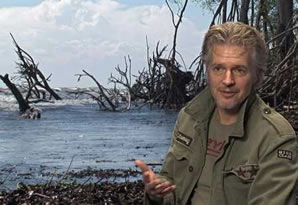
Frank Schätzing (Keulen, 28 mei 1957)
De Indiaase dichter, vertaler en literatuurwetenschapper K. Satchidanandan werd geboren op 28 mei 1946 in centraal Kerala. Hij doceerde Engels en gaf tien jaar lang leiding aan Indi’s Nationale Academie voor Literatuur. K. Satchidanandan publiceerde 22 dichtbundels, vele verzamelbundels, vertalingen en 19 essaybundels over literatuur.
Cactus
Thorns are my language.
I announce my existence
with a bleeding touch.
Once these thorns were flowers.
I loathe lovers who betray.
Poets have abandoned the deserts
to go back to the gardens.
Only camels remain here, and merchants
who trample my flowers to dust.
One thorn for each rare drop of water.
I don’t tempt butterflies.
No bird sings my praise.
I don’t yield to droughts.
I create another beauty
beyond the moonlight,
this side of dreams,
a sharp, piercing,
parallel language.
K. Satchidanandan (Kerala, 28 mei 1946)
De Ierse dichter en songwriter Thomas Moore werd geboren op 28 mei 1779 in Dublin. Zie ook mijn blog van 28 mei 2008. en ook mijn blog van 28 mei 2007 en ook mijn blog van 28 mei 2006.
As Slow Our Ship
As slow our ship her foamy track
Against the wind was cleaving,
Her trembling pennant still look’d back
To that dear isle ’twas leaving.
So loath we part from all we love,
From all the links that bind us;
So turn our hearts as on we rove,
To those we’ve left behind us.
When, round the bowl, of vanish’d years
We talk, with joyous seeming, —
With smiles that might as well be tears,
So faint, so sad their beaming;
While memory brings us back again
Each early tie that twined us,
Oh, sweet’s the cup that circles then
To those we’ve left behind us.
And when, in other climes, we meet
Some isle, or vale enhanting,
Where all looks flowery, wild, and sweet,
And nought but love is wanting;
We think how great had been our bliss,
If Heaven had but assign’d us
To live and die in scenes like this,
With some we’ve left behind us!
As travellers oft look back at eve,
When eastward darkly going,
To gaze upon that light they leave
Still faint behind them glowing —
So, when the close of pleasure’s day
To gloom hath near consign’d us,
We turn to catch one fading ray
Of joy that’s left behind us.
Thomas Moore (28 mei 1779 – 25 februari 1852)
Beeld van Dennis B. Sheahan in Central Park, New York
De Nederlandse schrijver en dichter Sjoerd Leiker werd geboren in Drachten op 28 mei 1914. Leiker volgde een onderwijzersopleiding. Hij heeft gewerkt bij een uitgeverij, in de journalistiek en bij de radio. Zijn literaire debuut maakte hij met een aantal gedichten in De Vrije Bladen. Zijn meest bekende werk is de roman Drie getuigen, die verscheen onder het pseudoniem Menno Haarsma bij de mede door hem opgerichte uitgeverij De Bezige Bij. Veel van zijn werk gaat over de Tweede Wereldoorlog. Hij schreef ook hoorspelen zoals Daar was de vrede, hier is de pijn. In 1992 werd door zijn weduwe de Sjoerd Leikerprijs ingesteld.
Uit: J.B. Charles 1910-1983
‘Ik heb in de oorlog tot mijn ontsteltenis gemerkt dat veel intellectuelen zich op gemakkelijke wijze lieten overtuigen van de vijandelijke en landverraderspropaganda, die zei dat de oorlog voorbij was en verzet tegen de bezetter niet alleen formeel illegaal, maar ook ethisch ongelegitimeerd was. ‘Dat schreef J.B. Charles (pseudoniem van W.H. Nagel) in Volg het spoor terug (1953). Charles, jurist, verzetsman en ook kunstenaar, begon al in de jaren veertig met de geschiedschrijving van het verzet. ‘Ik wil iets onderzoeken’, zo luidt zijn verantwoording. ‘En ik wil enige geschiedvervalsers een stok tussen de benen steken.’ Hij maakte duidelijk dat verzet wèl gelegitimeerd, dat wil zeggen gewettigd was. Eén van de kernpunten in zijn betoog, dat hij voortzet in Van het kleine koude front (1962), is dat niet Nederland op 14 mei 1940 heeft gecapituleerd, maar ons leger in de vesting Holland. De onvoorwaardelijke overgave van de rest van onze strijdkrachten, in Zeeland, volgde op 19 mei. De Duitse bezettingsmacht hield zich niet aan het ook door Duitsland geratificeerde Landoorlogsreglement. Die overeenkomst hield onder meer in dat de vijand van de Nederlanders geen persoonlijke diensten kon vorderen voor zijn oorlogsvoering en dat hij niet zou mogen ingrijpen in de binnenlandse politiek van het door hem bezette land.“
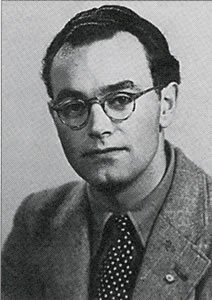
Sjoerd Leiker (28 mei 1914 – 15 december 1988)
De Amerikaanse schrijver Walker Percy werd geboren op 28 mei 1916 in Birmingham, Alabama. Na de suïcide van zijn vader in 1929 verhuisde zijn familie naar Athens, Georgia. Zijn moeder stierf twee jaar later in een auto-ongeluk. Percy en zijn twee broers werden daarna opgevoed in Greenville, Mississippi door hun oom William Alexander Percy, een prominente advocaat en dichter. Percy bezocht de Universiteit van North Carolina in Chapel Hill en studeerde in 1937 af in chemie. Vier jaar later, in 1941, behaalde hij een bul in geneeskunde aan Columbia University. Zijn medische carrière kwam echter tot stilstand nadat tuberculose bij hem werd geconstateerd, waarvoor hij de komende drie jaar in een sanatorium verbleef. Hij trouwde met Mary Bernice Townsend in 1946 en verhuisde naar Covington, Louisiana. Ook bekeerde de van huis uit protestantse Percy zich in deze periode tot het katholicisme. Vanaf het begin van de jaren ’50 ging Percy zich richten op het schrijverschap. Zijn eerste publicaties waren essays op het gebied van semiotiek en filosofie, en in 1961 publiceerde Percy zijn eerste roman, The Moviegoer. Deze kreeg een jaar later een National Book Award voor fictie toegekend. In 1998 werd The Moviegoer opgenomen in de lijst van de honderd beste Engelstalige boeken van de 20ste eeuw, opgesteld door de Amerikaanse uitgever Modern Library. Percy heeft vijf andere romans en verschillende non-fictiewerken op zijn naam staan.
Uit: The Second Coming
„Well then, does anything really change in a lifetime, he asked the sly sidelong-looking Andrea del Sarto in the Mercedes mirror? No, you are the same person with whom I struck the pact roaring out old U.S. 66 through the lonesome towns and empty desert. You don’t ever really learn anything you didn’t know when you were thirteen.
And what was that?
All I knew for sure then and now was that after what happened to me nothing could ever defeat me, no matter what else happened in this bloody century. If you didn’t defeat me, old mole, loving father and death-dealer, nothing can, not wars, not this century, not the Germans. We beat the Germans, nutty as we are, and now drive perfect German cars, we somewhat frazzled it is true, and shaky, but victorious nevertheless.
Ah, but what if the death is not in the century but in your own genes, that you of all men are a child of the century because you are as death-bound by your own hand as the century is you and you of all men should be most at home now, as bred for death as surely as a pointer bitch to point, that death your own death is what you really love and won’t be happy till you have, what then?
Then we’ll know, won’t we?
Grinning and shivering on the back seat thirty years later, teeth clacking, this raddled middle-aged American sat in his German car in the mountains of North Carolina hugging himself and making shoulder movements like a man giving body English to a pinball machine except that he was thinking about J. E. B. Stuart and Baron von Richthofen and World War II and fighting the Germans, which he had not done. Instead, he took two quick drinks from the gold-lined silver jigger and waited until the warmth bloomed under his ribs and the shaking stopped.“
Walker Percy (28 mei 1916 – 10 mei 1990)
De Australische schrijver Patrick Victor Martindale White werd geboren in Londen op 28 mei 1912. Van 1932 tot 1935 studeerde hij aan de universiteit van Cambridge in Engeland Franse en Duitse literatuur. Zijn eerste gedichten verschenen nog tijdens zijn studie in The London Mercury: Na zijn studie kon hij zich, gesteund door zijn vader, in Londen vestigen. Toen zijn vader overleed kon hij door de erfenis zijn werk als schrijver zonder geldelijke nood voortzetten. In 1939 vond hij een uitgever voor zijn eerste roman Happy Vall
ey. Tijdens WO II leerde hij als officier in de RAF in Alexandria de Griekse officier Manoly Lascaris kennen die zijn levenspartner zou worden. Na de oorlog kochten zij een huis niet ver van Sydney. In 1957 brak hij met de roman Voss ook in Australië door. In 1973 kreeg hij de Nobelprijs voor de Literatuur “voor een episch en psychologisch verhalende kunst die een nieuw continent geïntroduceerd heeft in de literatuur”
Uit: The Eye Of The Storm
„In the mountains the weatherboard and fibro townships were minding their own business. Chummier shops displaying pragmatic goods had nothing to hide. But doubts set in among the stragglers, towards the fringes, where houses built for permanence had reached the lurching stage, above the rich humus spread by their shrubberies to soften the logical collapse. The shrubberies themselves, planted by their owners as a sober duty, were touched with a cold apocalyptic fire. Here and there at the foot of a tree, old, broken, black umbrellas arranged singly or in clumps, were seen to stir at times, then to move, slowly, sideways asymmetrically. Some of the old umbrella-forms were trundling through an undergrowth of rhododendrons and azaleas assisted by what appeared to be part of their own aluminium frames, which had become conveniently unstuck, and could be used as crutches.
Basil was stopping the car in front of a shop. On a blind wall a square of faded bluebag was advertising some illegible commodity. Without explaining why, Basil was getting out. Nor did Dorothy ask for explanations: she was frantically searching for some face or object with which to identify herself. As Basil was closing the car door, a boy in jeans followed by a high-stepping spotted dog, came jaunting past. Dorothy tried smiling at the boy, but her smile must have looked directionless, or old; anyway the boy was plainly ignoring foreigners. When Basil had gone inside the shop, Dorothy was left with gooseflesh on her arms.“
Patrick White (28 mei 1912 – 30 september 1990)
Portret door Roy de Maistre, 1939
De Oostenrijkse schrijver Fritz Hochwälder werd geboren op 28 mei 1911 in Wenen. Hij werd opgeleid tot behanger, maar schoolde zich zelf als autodidact op historisch en politiek gebied bij. Zijn eerste drama werd opgevoerd tijdens de Wiener Kammerspielen in 1932. In 1938, na de aansluiting van Oostenrijk bij Duitsland vluchtte hij over de Rijn, zwemmend, naar Zwitserland. Zijn drama „Das Heilige Experiment”, over het mislukken van de Jezuietenstaat in Paragay werd voor het eerst in 1943 opgevoerd in Biel-Solothurn, Oostenrijk volgde in 1947. Het stuk bezorgde de schrijver zijn internationale doorbraak, uitgaande van Parijs, in 1952.
Uit: Das heilige Experiment
“Was habt ihr aufgerichtet da draußen (er zeigt auf die Landkarte) in Steppe und Urwald …! – Ein Reich der Liebe und Gerechtigkeit. … – die Indios singen Euer Loblied – und laufen unsern Grundbesitzern davon! Eure Produkte gehen in die Welt hinaus – unsere Händler verarmen. … Wir dehnen uns durch unsere Kriege aus – ihr durch euren Frieden. Wir bröckeln ab. Ihr sammelt an. … Wie lange dauert es noch – und euch gehört der ganze Kontinent! – – – Und wir, wir sollten dem zusehen, wir sollten euch nicht hindern? Narren wären wir, wenn wir euch nicht verjagten, solange es noch Zeit ist! … Schluss mit diesem Experiment, das uns gefährlich wird! Schluss!”
Fritz Hochwälder (28 mei 1911 – 20 oktober 1986)
De 28e mei is een vruchtbare schrijversdag. Zie voor nog meer schrijvers van de 28e mei ook mijn vorige blog van vandaag.


